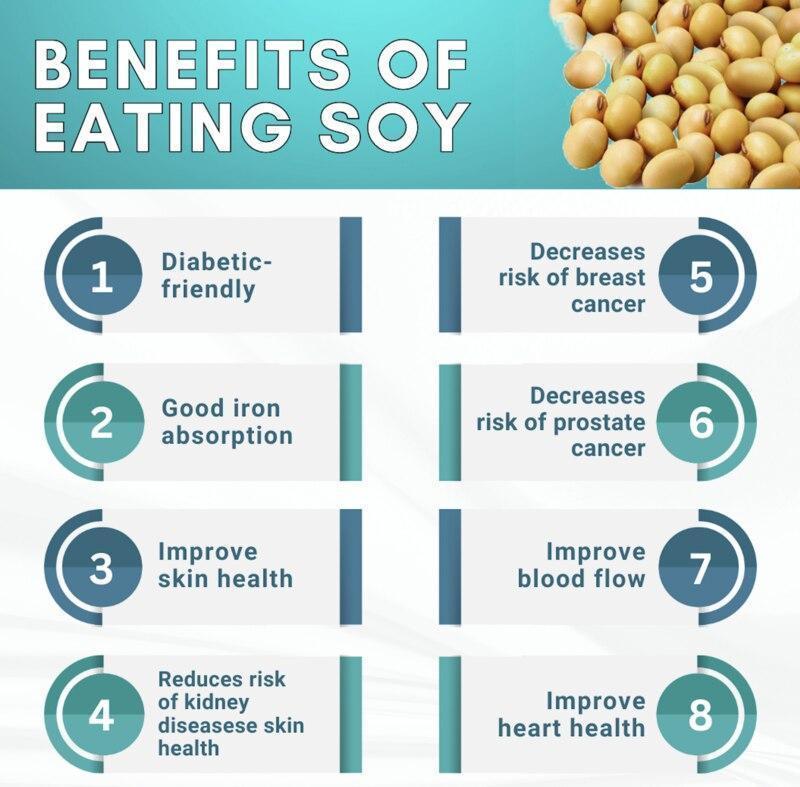The Soy Conundrum - Navigating Health Benefits and Risks
Feb 10, 2024 By Nancy Miller
The inclusion of soy in many diets ignites discussions about its health effects. This article illuminates the ongoing saga surrounding soy, acknowledging its advantages while also highlighting potential hazards. The aim is to equip you with knowledge that informs your decision to integrate soy into your diet. This article about soy evolves alongside our understanding of nutrition. We delve into the intricacies of soy's effects on the body, equipping you with comprehensive knowledge. This empowers your ability to make dietary choices that align directly with your health and wellness goals.
1. Benefits of Soy:
Renowned for its myriad health benefits, soy serves as an exceptional alternative to meat due to its rich reservoir of plant-based proteins, notably, a quality particularly attractive for vegetarians and vegans. Moreover, soy houses essential amino acids. These not only foster muscle health but also facilitate overall body function. Soy, a powerhouse of antioxidants, actively combats oxidative stress and diminishes inflammation. Its dense fiber content fortifies digestive health. It actively contributes to the maintenance of a balanced gut microbiome. Moreover, research indicates that consuming soy may significantly improve heart health by reducing cholesterol levels, an impressive finding. Soy's incorporation into a diet may benefit women undergoing menopause. Soy isoflavones mimic estrogen, potentially easing symptoms such as hot flashes.
The nutrient-packed profile of soy makes it a versatile and valuable inclusion in any balanced diet. In addition to these benefits, soy, a low-calorie food, presents itself as an ideal choice for individuals pursuing weight management. The inclusion of isoflavones in soy further fortifies health protection by reducing the risk of specific cancers. It is worth noting that incorporating diverse forms of soy such as tofu, edamame, or soy milk into your diet allows you to reap its manifold advantages while maintaining dietary variety.

- Consideration: Ensure to choose organic, non-GMO soy products to avoid potential risks associated with genetically modified variations.
- Caution: While soy is beneficial, excessive consumption may lead to an overabundance of certain nutrients, necessitating moderation in dietary choices.
2. Disadvantages and Risks of Soy:
Soy presents numerous health benefits. However, we must not disregard the potential risks linked to its consumption. Of particular interest is the existence of anti-nutrients, trypsin inhibitors, and phytates, which can impede nutrient absorption and digestion processes. Additionally, the presence of estrogen-like compounds in soy merits consideration: they could potentially disrupt hormonal balance. This is a significant concern for individuals with specific health conditions. Certain studies hint at a potential correlation between an overabundance of soy intake and thyroid complications. Nonetheless, further research is necessary to definitively establish this connection. The introduction of genetically modified (GM) soy elicits worries for certain individuals. It might potentially present obscure health risks.
Individuals with soy allergies should also exercise caution. Soy is a common allergen. To balance the scales, consuming soy in moderation and being mindful of individual health conditions is essential. This approach mitigates potential risks. We delve deeper into potential risks, particularly focusing on how Soy may impact thyroid function, a subject that continues to undergo extensive research. Those with existing thyroid concerns must consult a healthcare professional. Tailor their soy consumption to individual health needs.
- Consideration: Rotate soy with other protein sources to diversify your nutrient intake and minimize the potential risks associated with long-term soy dominance.
- Caution: Individuals with a history of thyroid disorders should consult with a healthcare provider before incorporating soy into their diet.
3. The Final Verdict on Soy: Is It Good for Your Health or Not?
Determining whether soy proves beneficial or detrimental to one's health hinges on moderation and individual context. For numerous individuals, integrating soy into a balanced diet potentially confers an array of advantages such as heart health improvement and hormonal equilibrium restoration. Nevertheless, those suffering from specific health conditions or allergies must exercise caution when dealing with soy. Consult with healthcare professionals to make an informed decision, particularly if you are considering soy-based supplements or a diet heavily reliant on soy.

Exploring the cultural significance of soy reveals its role in various cuisines worldwide, beyond simply its nutritional aspects. For centuries, Asian diets have considered soy a staple. It imparts not only health benefits but also enriches culinary experiences with diversity and flavor. The versatility of soy, manifesting as tofu in savory stir-fries or even as soy milk in lattes, imparts a unique dimension to global gastronomy.
The versatility of soy in culinary applications presents a myriad of options for individuals seeking plant-based alternatives. This is an important consideration. To enhance their nutritional intake, an enjoyable and accessible endeavor, incorporating soy into meals proves highly effective. However, it's crucial to maintain a varied diet–a practice that guarantees a comprehensive nutrient profile.
- Consideration: Balance soy intake with a variety of plant-based proteins and whole foods to ensure a diverse range of nutrients.
- Caution: Individuals with known soy allergies should carefully read food labels, as soy can be present in unexpected products.
Conclusion
In conclusion, the soy conundrum defies a 'one-size-fits-all' resolution. Comprehending its benefits as well as risks allows individuals to empower themselves. They can make choices that align with their unique health needs and preferences. The question is, does this mean soy is universally detrimental? The integration of soy into your overall dietary plan determines its impact. Embrace it as a component of a well-balanced, diverse diet to unlock its nutritional benefits. However, it’s crucial to approach soy with mindfulness. Consider individual health conditions and ensure moderation for optimal well-being. Individuals who make informed decisions about their soy consumption can leverage its potential benefits and mitigate the risks that often accompany it. So, don’t be scared of soy, but don’t make it a favorite. You should always maintain moderation in soy intake, but being aware of its advantages and disadvantages proves particularly crucial in making soy-related dietary decisions.







